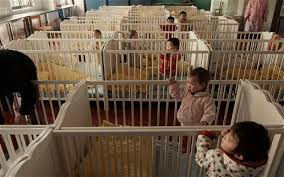Lesson 2: Psychosocial Causes of Abnormal Behaviour
Deprivation or Trauma
If children do not have sufficient care and interaction from parents (or primary care givers) during the formative years (birth to approximately five years), they may experience adjustment difficulties into adulthood. Deprivation (the lack of or an insufficient amount of loving and frequent interaction) may also occur with children who have parents in the home. If a parent, for instance, is mentally ill, he or she may not be able to provide adequate care, love, and attention to his or her child. The more extreme forms of deprivation occur when children are abandoned or orphaned and placed in institutions or a series of inadequate foster homes.
 A study by Provence and Lipton in the 1960s compared behaviour of infants living in institutions with that of infants living with families. The results of this study, recounted by Carson, Butcher, and Coleman, (1988) are as follows:
A study by Provence and Lipton in the 1960s compared behaviour of infants living in institutions with that of infants living with families. The results of this study, recounted by Carson, Butcher, and Coleman, (1988) are as follows:
|
“At one year of age, the institutionalized infants showed a general impairment in their relationships to people, rarely turning to adults for help, comfort or pleasure and showing no signs of strong attachment to any person. (They) also noted a marked retardation of speech and language development, emotional apathy, and impoverished and repetitive play activities. In contrast to the babies living in families, the institutionalized infants failed to show the personality differentiation and learning that can be thought of both as accomplishments of the first year of life and as the foundation upon which later learning is built.” |
Today, quality foster homes are more prevalent and the institutionalization of infants is rarely practiced. The importance of love and attention during the early years is very evident. Children who experience this type of deprivation may not recover, even if shown love and attention at a later time. The following is an account of “The Wild Boy of Aveyron.”